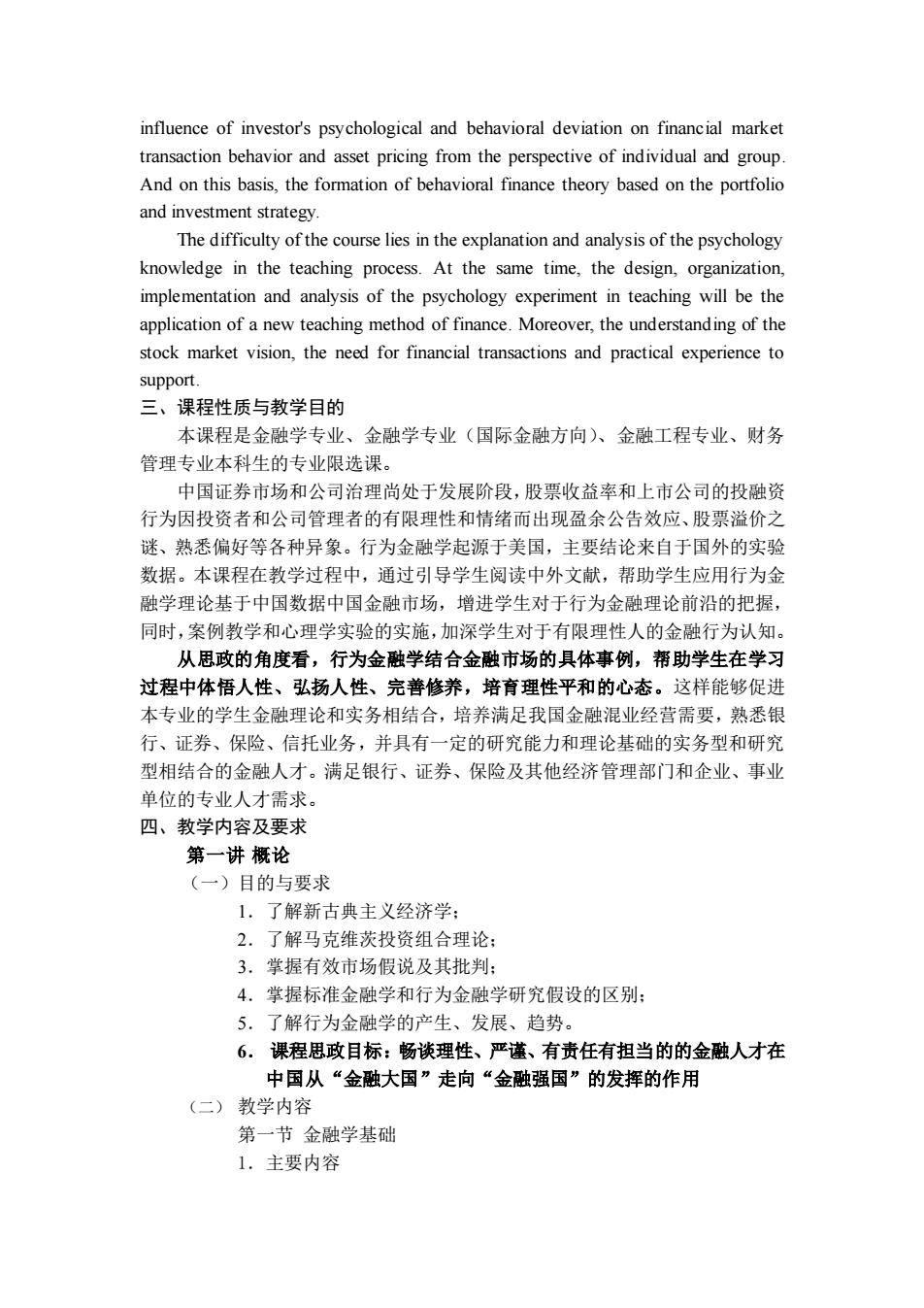正在加载图片...

influence of investors psychological and behavioral deviation on financial market transaction behavior and asset pricing from the perspective of individual and group. And on this basis,the formation of behavioral finance theory based on the portfolio and investment strategy The difficulty of the course lies in the explanation and analysis of the psychology knowledge in the teaching process.At the same time,the design,organization, implementation and analysis of the psychology experiment in teaching will be the application of a new teaching method of finance.Moreover,the understanding of the stock market vision,the need for financial transactions and practical experience to sunport 三、课程性质与教学目的 本课程是金融学专业、金融学专业(国际金融方向)、金融工程专业、财务 管理专业本科生的专业限选课。 中国证券市场和公司治理尚处于发展阶段,股票收益率和上市公司的投融资 行为因投资者和公司管理者的有限理性和情绪而出现盈余公告效应、股票溢价之 谜、熟零偏好等各种异象。行为金融学起源于美国,主要结论来自于国外的实验 数据。本课程在教学过程中,通过引导学生阅读中外文献,帮助学生应用行为金 种学理论基于中围数据中用金种市场,增讲学牛对干行为金种理论前沿的把根! 同时,案例教学和心理学实验的实施,加深学生对于有限理性人的金融行为认知: 从思政的角度看,行为金融学结合金融市场的具体事例,帮助学生在学习 过程中体悟人性、弘扬人性、完善修养,培育理性平和的心态。这样能够促进 本专业的学生金融理论和实务相结合,培养满足我国金融混业经营需要,熟悉银 行、证券、保险、信托业务,并具有一定的研究能力和理论基础的实务型和研究 型相结合的金融人才。满足银行、证券、保险及其他经济管理部门和企业、事业 单位的专业人大需求。 四、教学内容及要求 第一讲概论 (一)目的与要求 1.了解新古典主义经济学: 2.了解马克维茨投资组合理论 3.掌握有效市场假说及其批判: 4.掌握标准金融学和行为金融学研究假设的区别 5.了解行为金融学的产生、发展、趋势。 6.课程思政目标:畅谈理性、严谨、有责任有担当的的金融人才在 中国从“金融大国”走向“金融强国”的发挥的作用 (二)教学内容 第一节金融学基础 1.主要内容 influence of investor's psychological and behavioral deviation on financial market transaction behavior and asset pricing from the perspective of individual and group. And on this basis, the formation of behavioral finance theory based on the portfolio and investment strategy. The difficulty of the course lies in the explanation and analysis of the psychology knowledge in the teaching process. At the same time, the design, organization, implementation and analysis of the psychology experiment in teaching will be the application of a new teaching method of finance. Moreover, the understanding of the stock market vision, the need for financial transactions and practical experience to support. 三、课程性质与教学目的 本课程是金融学专业、金融学专业(国际金融方向)、金融工程专业、财务 管理专业本科生的专业限选课。 中国证券市场和公司治理尚处于发展阶段,股票收益率和上市公司的投融资 行为因投资者和公司管理者的有限理性和情绪而出现盈余公告效应、股票溢价之 谜、熟悉偏好等各种异象。行为金融学起源于美国,主要结论来自于国外的实验 数据。本课程在教学过程中,通过引导学生阅读中外文献,帮助学生应用行为金 融学理论基于中国数据中国金融市场,增进学生对于行为金融理论前沿的把握, 同时,案例教学和心理学实验的实施,加深学生对于有限理性人的金融行为认知。 从思政的角度看,行为金融学结合金融市场的具体事例,帮助学生在学习 过程中体悟人性、弘扬人性、完善修养,培育理性平和的心态。这样能够促进 本专业的学生金融理论和实务相结合,培养满足我国金融混业经营需要,熟悉银 行、证券、保险、信托业务,并具有一定的研究能力和理论基础的实务型和研究 型相结合的金融人才。满足银行、证券、保险及其他经济管理部门和企业、事业 单位的专业人才需求。 四、教学内容及要求 第一讲 概论 (一)目的与要求 1.了解新古典主义经济学; 2.了解马克维茨投资组合理论; 3.掌握有效市场假说及其批判; 4.掌握标准金融学和行为金融学研究假设的区别; 5.了解行为金融学的产生、发展、趋势。 6. 课程思政目标:畅谈理性、严谨、有责任有担当的的金融人才在 中国从“金融大国”走向“金融强国”的发挥的作用 (二) 教学内容 第一节 金融学基础 1.主要内容